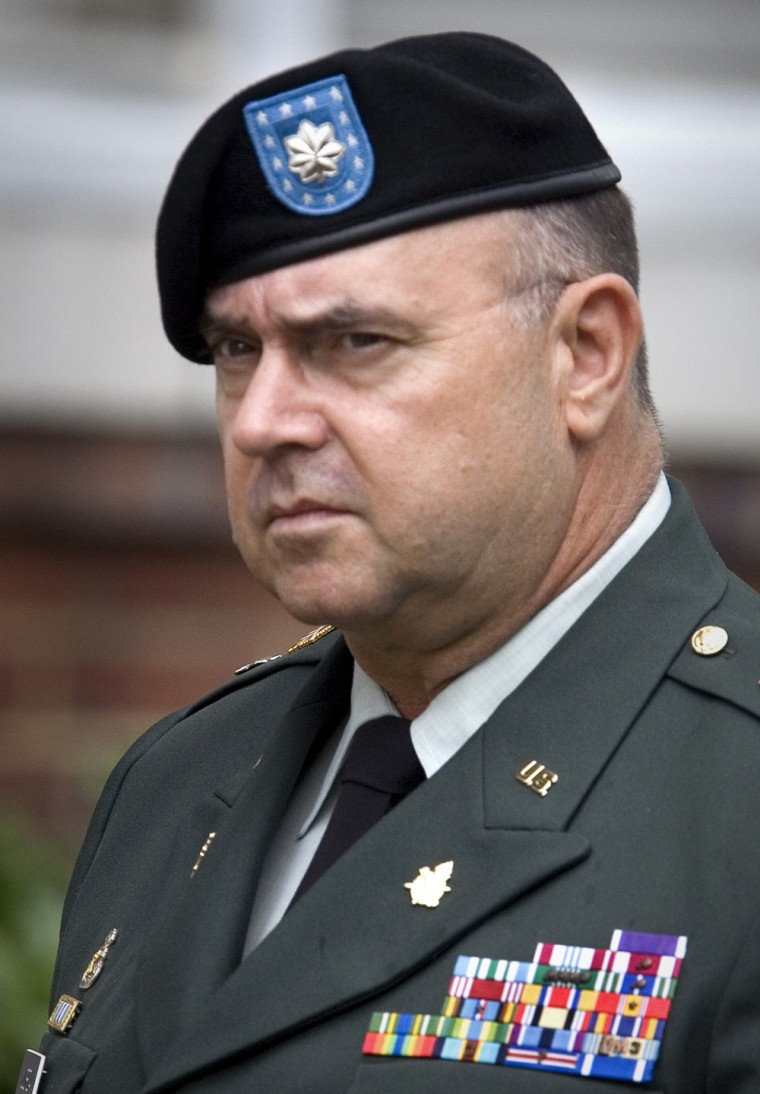A military court acquitted an Army officer Tuesday of failing to control U.S. soldiers who abused detainees at Abu Ghraib prison in Iraq, but it found him guilty of disobeying an order not to discuss the abuse investigation.
Lt. Col. Steven L. Jordan was the only officer and the last of 12 defendants to go to trial in the 2003 Abu Ghraib scandal, which embarrassed the Pentagon and shocked the Muslim world.
The allegations at the U.S.-run prison came to light with the release of pictures of U.S. soldiers smiling while detainees, some of them naked, were held on leashes or in painful and humiliating positions at the prison. Jordan, 51, never appeared in the inflammatory photos, but he was accused of fostering a climate conducive to abuse.
The jury of nine colonels and one brigadier general deliberated for about seven hours before issuing its verdicts Tuesday. It also deliberated on a sentence Tuesday but recessed and is scheduled to continue Wednesday.
Prosecutors recommended that Jordan be reprimanded and fined one month’s pay, about $7,400. The defense asked the panel for no punishment.
The jury acquitted Jordan of three counts: cruelty and maltreatment for subjecting detainees to forced nudity and intimidation by dogs; dereliction of a duty to properly train and supervise soldiers in humane interrogation rules; and failing to obey a lawful general order by ordering dogs used for interrogations without higher approval.
The jury found him guilty of one: disobeying a general’s order not to talk to others about the investigation into the abuse.
Officer faces 5 years in prison
Jordan, a reservist from Fredericksburg, Va., stood at attention facing the jury as the panel president, a brigadier general, read the verdict.
He faces a maximum sentence of five years.
At an afternoon sentencing hearing, Jordan told the panel in a choked, halting voice that he respected its decision and took sole responsibility for his actions.
“I know when you receive an order, if clarification is needed, it is my job to get the job done,” he said.
Jordan said he had been living and working under a cloud since the investigation began 3½ years ago.
“When I first saw photographs of the horrible abuses at Abu Ghraib, I was shocked and I was saddened. It did not represent the U.S. soldiers that I know and love,” he said.
“After today, I hope the wounds of Abu Ghraib can start to heal.”
Jordan said his ordeal had been difficult on his three children and had harmed him physically and emotionally.
Conflicting notions of responsibility
During the sentencing, the defense called 13 witnesses who praised Jordan’s dedication and leadership qualities. They included seven senior officers, five of them now retired, who worked with Jordan during his 28-year military career, and four lower-ranking soldiers who served with him at Abu Ghraib.
Attorneys for the government and the defense declined to comment.
Jordan was director of Abu Ghraib’s interrogation center from mid-September until mid-November 2003. He was also the senior officer inside a prison cell block on Nov. 24, 2003, during at least part of an episode that included a strip-search for smuggled weapons and a dog brought in to intimidate a detainee during questioning in his cell.
The four days of testimony in the case offered conflicting notions of command responsibility.
The prosecutor said in his closing argument Monday that Jordan wasn’t court-martialed for what he did at Abu Ghraib, but for what he didn’t do.
“He didn’t train. He didn’t supervise,” Lt. Col. John P. Tracy told the military panel.
The defense countered that Jordan was outside the command chain and therefore not responsible for the military intelligence soldiers who interrogated detainees and the military police who guarded them.
“There is no evidence of a failure to train and supervise, no evidence of failure to ensure compliance,” Maj. Kris Poppe said in his closing for the defense.
Eleven enlisted soldiers have been convicted of crimes in connection the Abu Ghraib scandal. The longest sentence, 10 years, was given to former Cpl. Charles Graner Jr., of Uniontown, Pa., in January 2005. Lynndie England, who was an MP reservist from Fort Ashby, W. Va., and the most recognizable face from the Abu Ghraib photos, was sentenced to three years.
